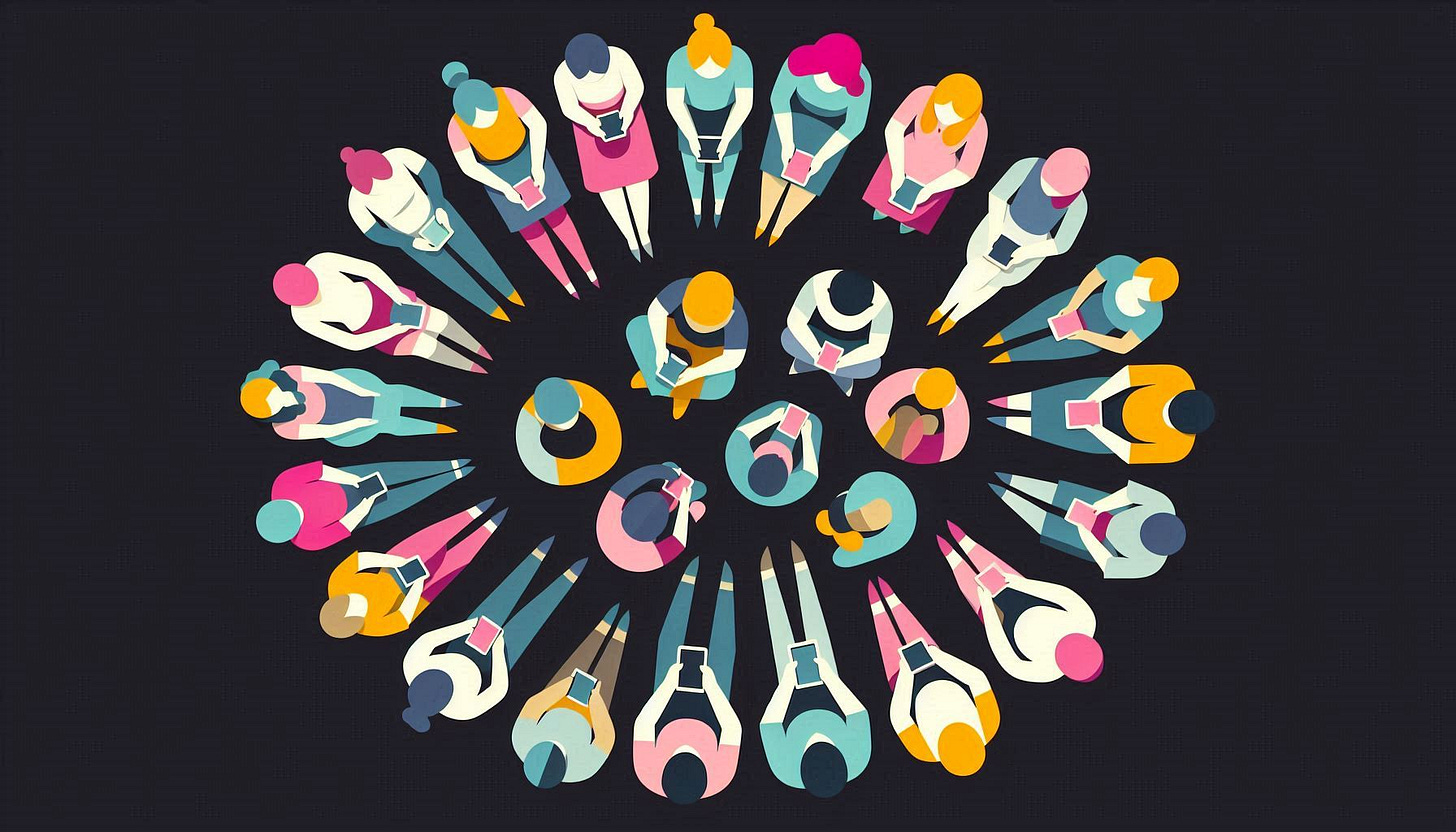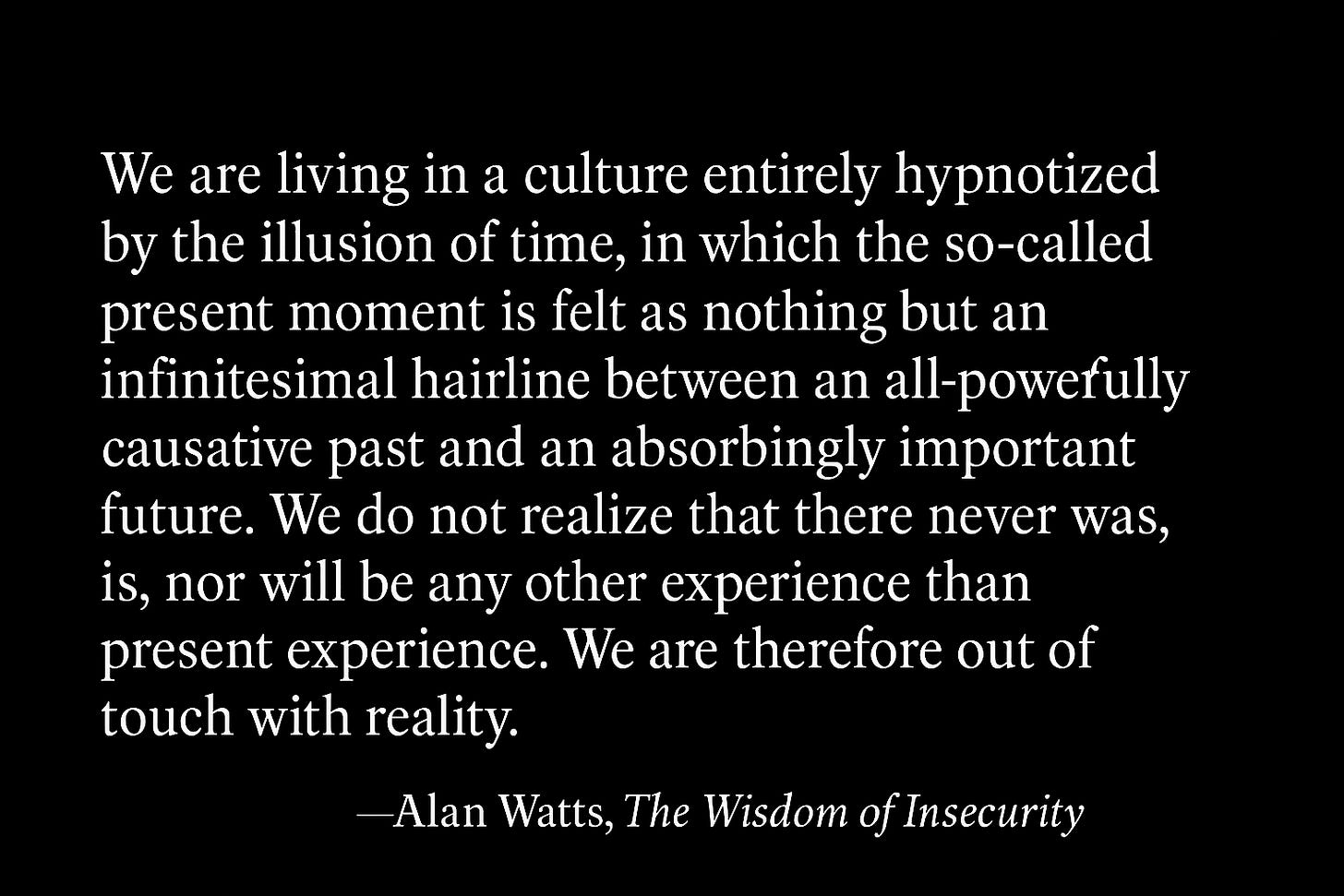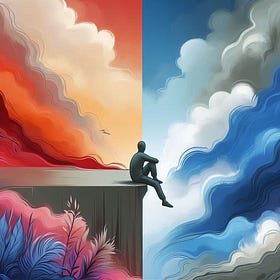Who Owns Your Time?
We are losing the war for our attention
To the Deep Thinkers,
Welcome to the Deep Thinkers Newsletter: A collection of essays dedicated to going beyond the surface.
If you’re new here, check out the Deep Thinkers archive.
I’ve been thinking about death a lot lately. Not in a morbid sense, but as a mirror for life. Watching the youth move through their first chapters has pushed me to reflect on my own unfinished book, and on the temporary place we all hold here in this world.
I think of my girlfriend’s nieces (a four and a one-year-old), and wonder what the future holds for them. What kind of world will they inherit, and what will they make of it? When I was a kid, I couldn’t even comprehend not existing, not because I was ignorant of death, but because the end of life felt impossibly far away. To be a child is to experience the quiet conviction of immortality in its purest form.
Eventually, we come to understand that life is not infinite, that we won’t live forever. More than anything, we come to see that we don’t have an unlimited supply of time, and every second that passes belongs to death.
The quote that shook me out of my recent bout of writer’s block and inspired me to write this essay was one by Simone Weil from her book Gravity and Grace.
She wrote:
Belief in immortality is harmful because it is not in our power to conceive of the soul as really incorporeal. So this belief is in fact a belief in the prolongation of life, and it robs death of its purpose.
These words reminded me of a seemingly unrelated experience (though I think they are connected). A few days ago, I met a friend for coffee. While we waited for our drinks, we chatted idly. Mid-sentence, he started fiddling with his phone. “Uh-huh, yeah, yeah,” he said. He wasn’t listening anymore. Then he stood up, aimed his phone at a nearby display, and began snapping pictures.
“I’m still listening,” he said.
But he wasn’t. He was trying to get the right angle. I stopped talking, then he sat down and tried to pick up the conversation, but the energy was off. I didn’t call him out (maybe I should’ve), I just let it slide, not wanting to sour the mood any further.
Now this wasn’t a one-off thing, and my friend is not the only person I know who does this. Many people I know have become accustomed to splitting up their attention this way. Usually, whatever hijacks their focus can be found on their phone, and almost none of them think they actually have a problem, because as a society, we’ve turned divided attention into a virtue. Like it’s something to be proud of.
As if never being able to focus on just one thing at a time is normal. Well, it isn’t. Our ability to focus, to live with presence, has been assaulted, and until we reclaim control over our most valuable resource (our time), those who profit off this heist will continue raking in money while our seconds, hours, years tick away, leaving us, in the end, with only a muddled recollection of how we spent them.
Why Are We Not Angrier?
Our attention has been debased, and I wish more people saw it for what it was—a crisis. No matter what you believe happens after death, one thing is certain: there is no immortality here on Earth. Our time is ticking away. So why exactly have we allowed so much of it to be stolen so freely? Ironically, we do know how valuable attention is; just look at the content creation space. It’s been a renaissance of sorts—anyone with a phone and an idea can change the course of their lives, and that is actually remarkable.
And yet. And yet, the internet, more than ever, is destroying us.
How much time is spent watching someone else live their lives instead of inhabiting our own? Just as troubling, our ability to maintain focus on anything that truly demands attention has begun to wither (and is only getting worse). Anxiety hums constantly in the background, pulling us toward the next task as we try to finish the one in front of us. Presence is all but non-existent. Moments slip through our fingers like sand, only here, nothing remains to show for what we’ve lost.
The more aware you are of the tactics used to steal your attention, the more overwhelming it actually feels. Maybe if it were just social media, it wouldn’t be as bad. But it’s every platform, every app. They want to take as much time from your bank as possible, and when they do, there’s no deposit to replenish it. It’s gone. Just like that. And it doesn’t feel right. None of it does.
People will shrug and say, ”That’s the way the world works now.”
No. Passive acceptance is part of the problem. We should be furious. We should feel the rage that burns crimson and refuses to forgive, the kind meant for revolution. Because revolutions only change things when enough people wake up and get really, really angry.
But what good is revolution if we can’t stay present with the people right in front of us? When a friend says they’re “fine,” do you notice the dimness in their eyes that says otherwise? Can you sit with the weight of uncomfortable silence without reaching for your phone, without looking to your feed for a lifeline?
Don’t worry—I’m right there with you. I know how hard it is. Discomfort and boredom have been trained out of us, and not by accident. We are amusing ourselves to death, conditioned to treat the endless scroll as natural. But it’s not. It’s engineered. Some like to call this age of technology a natural step in human evolution. Please. This isn’t evolution, it’s sedation. The cheap dopamine drip is easier to take than the effort it takes to resist, and so those who profit from that weakness keep exploiting it, again and again.
We are the free labor and the product for companies that profit from our screen time. Our attention is the commodity they crave, and the fight is not a fair one. Companies hire teams of brilliant people—psychologists, behavioral scientists, game designers—whose sole job is to figure out how to keep us hooked. They study casinos and other industries built on exploiting dopamine. They know the exact features to implement to light up our brains, and they use that knowledge to keep us fiending for more.
Sean Parker, the founding president of Facebook, is on record, saying:
“The thought process that went into building these applications, Facebook being the first of them … was all about: ‘How do we consume as much of your time and conscious attention as possible?’ That means that we need to sort of give you a little dopamine hit every once in a while, because someone liked or commented on a photo or a post or whatever. And that’s going to get you to contribute more content and that’s going to get you … more likes and comments.”
I can see how we got here, how so many people can’t see the effects even away from their screens. Fragmenting our attention is treated like a skill, multi-tasking worn as a badge of honor. But where is the pride for focusing on one thing and giving it our undivided attention? For lingering? For contemplating? The attention economy has eroded our desire for depth. It’s done this by removing what makes our attention valuable in the first place.
Our time is stolen so easily because we’ve forgotten what it truly means to lose it. It’s ironic—many say they don’t have the time to watch long-form videos or to read thoughtful essays, yet they’ll sink hours into a marathon of bite-sized clips like it’s nothing. Online, appearance outweighs substance, and performance matters more than truth. Pushing against such a massive tide can often feel pointless because there’s no singular evil mastermind pulling the strings from a dark lair. The infestation is systemic now. The chaos is rooted so deeply into the fabric of society that hopelessness seems to be the only certainty.
But I reject hopelessness. Those who’ve written about this topic (especially Tamara and Gurwinder, who each wrote outstanding pieces on the impact of the attention economy), the ones trying to pull us from a zombified state—these are the people who remind me that the effort is still worth it.
We are waging a war—one for our attention. A war that countless people are still blind to. One that will leave lasting ruins, like the remnants of wars once fought for liberty (and no, I’m not being hyperbolic). What makes this war especially insidious is that even its generals, the very people who built these platforms, refuse to let themselves or their families fight on the frontlines.
As Chamath Palihapitiya, former vice-president for user growth at Facebook, admitted in 2017:
“The short-term, dopamine-driven feedback loops that we have created are destroying how society works. No civil discourse, no cooperation; misinformation, mistruth. This is not about Russian ads. This is a global problem. It is eroding the core foundations of how people behave by and toward each other. I can control my decision, which is that I don’t use that shit. I can control my kids’ decisions, which is that they’re not allowed to use that shit.”
What does it say when notable figures in the tech space insulate themselves from the very platforms that keep them rich? They know what their creations are doing to us, and tech won’t stop evolving, so what can we do? How can we fight back? How can we reclaim control over our most precious resource?
We Are Not Powerless
For a few reasons, our fight is not a fair one. We are vulnerable to social approval, and our enemies know it. We seek opportunities of escape from our real lives, and of course, they know this, too. They salivate over the chance to exploit our weaknesses. And in the infinite scroll, we also lose more than time. We lose ourselves as well. In her essay, The Attention Economy Is Making Us Emotionally Poor, Tamara writes:
You are not seen, you are processed, scanned for resonance, repackaged for virality, forgotten as soon as the scroll moves on.
That’s right, we don’t just feel this way online anymore. We now feel it in the real world, too. People scroll past you, even those you know—those who love you. You become just one of the many things battling for their attention, your presence fragile and fleeting.
Honestly, it’s easy to see how the internet and the portals we use to access it have kept us captivated. Things like reading and writing demand cognitive effort. The payoff requires that you put in some work on your end. They’re the mental equivalent of lifting weights. Meanwhile, our phones can consume hours of our lives, leaving us mentally fatigued and emotionally depleted—all with very little to no exertion at all.
And even still…with all of that said, all is not lost. No one person or group is going to topple the empire of time thieves. But our brains aren’t permanently compromised. We can bend back the other way, and that is because focus is a skill. You can strengthen it, nurture it, revive it when it’s gone dull. Our brain’s plasticity lends its hand to this. In other words, the war may be rigged, we may be fighting an uphill battle, but we are not powerless.
I’ve always felt that a to-do list was essential. I like to have a plan for the day, to move from box to box, checking off tasks. But this preoccupation with productivity and “maximizing the day” leans so far into a rejection of presence more times than not. I’ve forgotten how to linger for its own sake. If there’s no end goal, I grow restless. The internet only amplifies this sense of restlessness.
Online, stillness is for the lazy and unmotivated. The ever-present feed whispers: don’t get out-hustled (to be fair, this could just be my algorithm). I am not immune to the whispers. Just one motivational reel can convince me I’m wasting my time sitting still, that presence is just procrastination masquerading as mindfulness.
However, the problem isn’t the message itself, but an inability to give it the proper context. Life isn’t a perfect balance, no matter what anyone says. Sometimes, burnout is inevitable. It’s the price of chasing goals, creating something lasting, or being fully present for someone else. The issue isn’t the extra work; it’s failing to remain present within it. It’s not allowing yourself to linger in even the most intense moments.
You can always reclaim your attention; you can always choose to treat time like the treasure it is. Start by taking long breaks from your phone whenever possible. And when you consume media, choose the kind that demands your focus, like books. Reading forces you to work for the payoff; it nudges you to imagine, to rationalize, to form opinions based on deep engagement, not passive consumption. That kind of effort sparks new ideas and strengthens your ability to think deeply. The same goes for films that require your full attention. Whereas social media and Netflix-exclusive content designed for second-screening don’t challenge us at all—they instead leave us bloated and dulled.
Freedom From the Feed
I usually see the glass as half empty, and this Substack is my way of trying to see the other side, to stay even a little hopeful. I write these words not just for you, but as a reminder to myself.
But of course, hope always comes with its own doubts. Is believing things can get better just idealism? Is it pure fantasy? Am I naive to think I can live a life of contemplation and still pursue what I want? I’m not sure. What I do know is I’m tired of having my time stolen. I’m tired of reaching for my phone the second life gets uncomfortable.
Because true presence—you know, really giving yourself to life and to other people—doesn’t always feel good. That’s what makes it so hard. Still. Something does shift when we step away from the feed for long enough. We may notice the issues we can actually fix. Or we might notice issues we didn’t even know existed. We may show up as better friends, partners, and neighbors. Logging off won’t stop the tide, but it does make us better equipped to ride the wave.
Depending on where you look, it’s easy to think that everything is bleak and that talking about this is pointless. But I know the joy of true focus—of slowing down, refusing to rush, and allowing myself to linger. It’s the closest I feel to being free. Free from all of it. The comparison. The anxiety. The stoked outrage. It’s in these pockets of presence that I feel like an actual person and not a cog in a rotten system.
We are all marching toward the end, our time floating into the ether with each breath we take. Presence doesn’t make us immortal, but it does remind us of our humanity. And remembering who we are, that might be the only real defense we have left.
Enjoying the essays? Consider becoming a paid subscriber to support more thoughtful, in-depth work like this.
Or leave a one-time tip—every little bit helps
Your support, whether monetary or simply sharing this essay, means the world to me.
✍🏾 In Case You Missed It:
Disappoint Others Before You Disappoint Yourself
Why living with integrity means learning to let people down
On the Verge of Being Great and on the Brink of Breaking
I’ve learned what I needed to learn, and now I need to get to the next level.
But where is the entrance to this next level?
Much love,
—Jon ♾️







Amazing!! Thank you. A wonderful insight into our world. Everywhere I go I see what I call the zombies on the street walking or waiting for a bus staring at these stupid time wasting toys. Love this and thank you once again for the reminder.
Thank you so much for this. You're such an amazing writer and I hope you never stop writing and inspiring people to be better